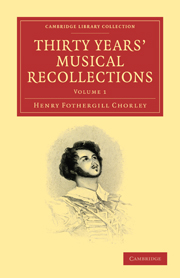THE YEAR 1835
Published online by Cambridge University Press: 29 August 2010
Summary
In the year 1835—the return of Lablache to Paris and London, completed that quartett of accomplished singers and artists, which for many following years was to present performances unprecedented in their evenness and finished concord.—The admirable union thus made up was improved to its utmost by the Parisian managers—always more courageous in catering for novelty than our London ones have been.—It was by them that Donizetti's “Marino Faliero,” and Bellini's “I Puritani” were commissioned from their composers—Signor Rossini having retired into the obstinate silence which no temptation could induce him to break.
The production of these two new operas, then, in London, was the event of the season. On such occasions there is always a success and a failure.—The public will not endure two favourites. In spite of the grandeur of Lablache as the Doge of Venice,—in spite of the beauty of the duett of the two basses in the first act of “Marino,”—in spite of the second act containing a beautiful moonlight scene with a barcarolle, sung to perfection by Ivanoff, and one of Rubini's most incomparable and superb vocal displays,—“Marino Faliero” languished—in part from the want of interest in the female character—a fault fatal to an opera's popularity.—On the other hand, from first to last note, “I Puritani” was found enchanting. The picture of Grisi, leaning against Lablache to listen, in the second scene—the honeyed elegance of Rubini's song of entrance—the bridal polacca in the first act—in the second, the mad scene, and the duett between the two basses (a feebler repetition of effects already produced in “Norma,”)—entranced “the town.”
- Type
- Chapter
- Information
- Thirty Years' Musical Recollections , pp. 91 - 102Publisher: Cambridge University PressPrint publication year: 2009First published in: 1862



